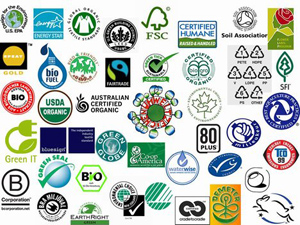有太多的生态标签和绿色评分吗?

每天,我们每个人都面临着压倒性的选择。从我们早上醒来,直到我们上床睡觉,我们在我们拥有的数千个选择中赚了数百个决定。杂货店现已携带30,000多家独特的产品,许多大盒式零售商携带超过100,000。作为一个社会,我们喜欢选择。事实上,美国成立于个人的自主权,可选择,追溯到独立宣言。
But having so many choices isn't always good for us. Thomas Jefferson's declaration of our inalienable right to liberty has gotten a bit out of control. We spend a large amount of our time making irrelevant and unimportant decisions. Such complex decision making causes stress, anxiety and self-doubt.
When faced with the choice of 300 different types of cookies in the store aisle, whether I choose to buy Chips Ahoy or Oreos will have no impact on my well-being, but yet I still spend three minutes agonizing over each package.
Likewise, we face a similar conundrum with ecolabels. With over 300 ecolabels and many more being added each year, consumers and businesses have to make increasingly complex and convoluted decisions. Manufacturers must weigh many different factors when making their choice of what ecolabels to get for their products, including cost, ROI, and credibility of the label.
Businesses of all types must decide what, if any, ecolabels they trust for purchasing. In the business world, especially at product companies, managing sustainability certifications, standards and labels requires at least a full-time position.
But businesses have an easier decision-making process than consumers. Businesses make a significant financial investment in choosing the "correct" ecolabel(s) and therefore spend time evaluating their myriad of options, weighing the pros and cons, and meeting with the various certification organizations to hear why their program is better than the others.
Consumers only have the luxury of a few seconds to make their choice while in a store aisle. Although mobile technology now makes it easier to access information anywhere, an ordinary consumer in the store aisle isn't going to spend thirty minutes evaluating cleaning products with three different certification labels to learn which one is best.
一小部分消费者愿意挖掘细节,并完成他们的研究,以决定哪一个对他们更好,但大多数愿意根据可持续发展做出购买决策的消费者只想想要一个关于他们应该购买的建议。必威体育2018这就是为什么能源明星在消费市场中如此成功;一个权威机构提供了一种做出选择的简单方法。
通过no means am I advocating for the elimination of all ecolabels and development a system with one choice. That would be even more disastrous. A competitive market is necessary in order to keep raising the bar on all ecolabels in the market. Having various programs compete on transparency, rigor, credibility, service and price, ensure all stakeholders receive maximum value from the market.
What we need is an oligopoly with larger barriers to entry. A handful of credible certification programs, labels and rating systems to dominate the market. This will minimize consumer confusion while working to ensure labels and ratings are held to high standards. Despite the hundreds of ecolabels that exist, this scenario isn't actually too far from where we are now.
While there may be hundreds of labels, any given decision requires no more than a few choices. Ecolabels are segmented by product category, industry or geography. When I go to buy paper, or glass cleaner, or seafood in the supermarket, I'm not choosing among hundreds of ecolabels, I'm choosing among a small subset for each of my decisions.
虽然有更多的and more ecolabels being introduced by many different organizations, from nonprofits to retailers, there is also consolidation starting to happen. UL recently acquired the Canadian certification program TerraChoice. In the past year we have also seen considerable consolidation in the SRI industry, with MSCI ultimately swooping up RiskMetrics, KLD, and Innovest.
There is little doubt that the sustainability labeling and ratings space may now be heading down a path of further collaboration and consolidation. Consumers will continue to become more concerned with the products they buy, businesses will invest more in green marketing to communicate with their customers, and credible labeling and ratings schemes will continue to grow as a key aspect in all product purchasing decisions.
Joshua Saunders is the senior director of business development forGoodGuide.




